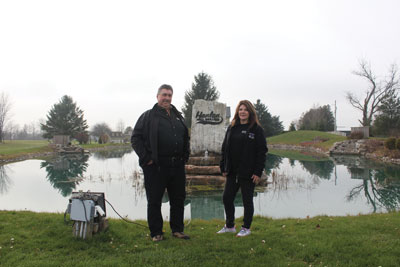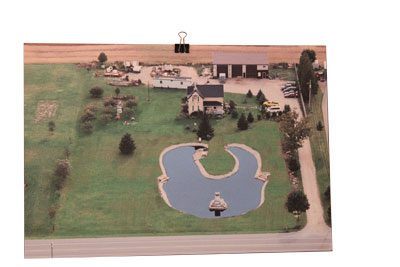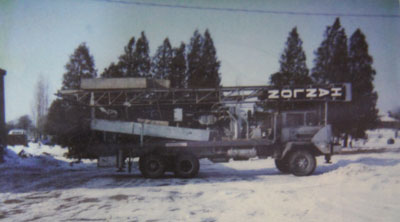
Features
Research
Strategies & Innovations
Hangin’ with the Hanlons
Hanlon Well Drilling’s ups and downs in Ontario.
January 9, 2013 By Laura Aiken
It seems fitting that Henry Hanlon’s property should become a local
point of reference: a landmark for travellers of Guelph’s countryside.
It seems fitting that Henry Hanlon’s property should become a local point of reference: a landmark for travellers of Guelph’s countryside. After all, the Hanlon name goes right back to the birth of this Ontario city in 1837. Four generations of Hanlons, spawning from an Irish immigrant named Felix, are woven into the community’s fabric. The Hanlon Parkway, which links highways 401 and 7, is called highway 6 on road maps but “the Hanlon” to anyone living in Guelph.
 |
|
| Kathy and Henry Hanlon built the pond and local landmark on their country property that is also home to their water well business. Advertisement
|
The stone fountain bearing the name Hanlon Well Drilling sits proudly in the pond occupying much of the front lawn leading up to the century home and shop where Kathy and Henry have experienced the ups and downs of entrepreneurship, raising six children and performing the no-small-feat of coaching two hockey teams every year for the past 22 years. The pictures of kids and 10 grandkids, drill rigs, staff, the homestead and a whole lot of hockey that lace the shop office all point to a life that turned out just as it was meant to be. But it isn’t the life Henry had planned on.
Some moons ago, he was enrolled in Sheridan College and enticed into the food business by a cousin who owned a Mother’s Pizza Parlour & Spaghetti House franchise. He started as an assistant manager, making the rounds with stints in various locations. When he got an inkling Mother’s Pizza, as it was commonly known, was going defunct (which it did), he found a partner and came up with a novel concept: a roadhouse-style restaurant and bar attached to a laundromat, complete with two-way glass from the bar area so patrons could keep an eye on their stuff. This became Henry’s plan. As sometimes happens with plans, this one went awry after years of pursuit.
A friend he played in a band with ended up requiring knee surgery after some playful wrestling accidentally gone amuck and asked him to fill in for him at his job with a local water well driller. Henry ended up working for the driller for two years while he and his partner were putting together the needed elements to launch their restaurant idea.
“So when we were all ready to launch this thing, my buddy takes off out west with his new girlfriend and leaves me hanging,” says Henry, a trace of disbelief still hanging in his voice. “So I was like, what do I do now? Do I downsize it? Do I do it for less money?”
The well driller he was working for knew he was in limbo and offered to sell him his well business, so Henry asked, how much?
“Without saying too much, we didn’t come to an agreement so I went out and bought my own machine when I was 25.”
On Aug. 18, 1988, Hanlon Well Drilling officially became the business Henry was destined to start. While no roadhouse bar, it would certainly put him on the road. Most well businesses are multi-generation and Henry had his work cut out for him to establish his name. He attributes much of his success to the family name and his dad, who supported him with good words in the community, but he pounded a lot of streets too.
 |
|
| An aerial view of the Hanlon homestead.
|
“It was busy back then; the drillers were too busy. I got some of the overflow; mind you some of them were trying to give me the real crappy jobs.” Being the new kid on the block isn’t always easy. But the new kid toughed it out, stuck around and now the Hanlon family, with one son in the business and one working elsewhere as a well driller, has a successful full-service well business to show for it.
The business serves a rolling swath of southern Ontario that includes Toronto/GTA, smaller cities such as Guelph, and a bucket full of rural towns. The services run a good gamut: drilling, plumbing, water treatment and geothermal work. Henry installed the wells for the city of Guelph that a population of about 120,000 draws from. This was one of his biggest projects and involved drilling four large-diameter wells.
“We pumped 1,300 gallons per minute for seven hours,” says Henry.
“We were making a small lakes,” adds Kathy with a laugh.
Hanlon Well Drilling has tackled some big jobs with a small team. “Right now, we have two well drillers, two pump installers and one plumber, all licensed of course,” says Kathy. And then there’s Henry, Rozanna Hersak (office manager) and daughter Michelle, who is helping out with filing temporarily. Kathy looks after things like water treatment, looking up well records and getting contracts and ministry packages ready. The lot is home to one rig (used to be two but they sold one – sometimes bigger isn’t better, explains Kathy), two pump trucks, a water truck to accompany the rig and a truck for the plumber. Hanlon Well Drilling is about to finish up one 38-well subdivision in Paris, Ont., and will be starting up another in Inverhaugh that will help carry the company through the winter. Rural subdivisions are “not as plentiful as they once were,” says Henry. Replacement wells and custom homes are more commonplace work these days in Halton Region, but there is still some subdivision work, as his contracts show. In the beginning, he says, he’d have 10 wells, and while he’s never gone under that, he was more like 40 wells ahead in the ’80s. Henry, who represents water well drillers on the Ontario Geothermal Association board, says there was a surge in geothermal work but since government incentives stopped it is mostly commercial work available in that area. Hanlon Well Drilling has done geo installations for the likes of Sudbury’s Laurentian University, Parry Sound Hydro and the press building at the Canadian National Exhibition Place. But it’s not so much the big jobs as the small done with heart that are the feel-good moments for the Hanlons.
“What personally makes me feel good is the poor guy that’s got little money and we manage to pull off getting there and getting them back in water within a couple of days,” says Henry. “When you pull out the driveway and people are back in water it makes me happy.”
“Once a month or once every two months you get a nice card or letter in the mail saying what a great job and thank you,” says Kathy with a smile of knowing their service means something to people.
In this competitive industry and part of the country, Henry says that aside from service, the one-stop shopping aspect of their business model has been a solid advantage.
“We’re here to look after them right through the well to the water treatment because we know the characteristics of the well, we know what kind of pump it is, and I think offering that service is a lot of the reason we’ve been successful over the years.”
Business success comes down to dollars and sense in many ways. The Hanlons have done their share of streamlining, going from two rigs to one, and at one time had 15 employees. On the geothermal side of business, he says he feels there is more price undercutting than on the water well side, but still finds the odd business charging far too little.
“We’re charging somewhere around $45 per foot and $1,100 for an environmental package whereas somebody can come in and do it for $38 with no environment package. Fuel goes up, insurance goes up, casing goes up, the cost of business goes up and so should price of well drilling . . . these are million-dollar pieces of equipment that need to be maintained and replaced as well as the service vehicles, so that’s got to be worked in to the cost per foot.”
Like many business owners, the Hanlons have an accountant who will raise a flag when it’s time to raise prices. Henry says he would like to see the prices go up a dollar per foot a year. Unfortunately, as contractors know, this doesn’t always translate into reality.
“The accountant will say you’ve got to raise your price up and I say, well, easy to say, but I go to $48 a foot and my competition is $43 to $45, well I’m not going to get any work. I understand the point and that’s the way it should be. But that’s not day-to-day life. That’s not reality.”
However, the ongoing financial nuts and bolts of running a water well business can pale when stacked against a rig catastrophe.
As Henry says: “Success is not just all a bed of roses.”
 |
|
| The early days.
|
Early in the business, he had a rig flip over on a site, and has since endured the mechanical losses over the years that ever driller faces. But the real kicker came in 2007. His friend, newly convinced of the good of seatbelts, was driving in Henry’s rig down the 400, a major highway, to do a job for the city of Barrie. Near Innisfil, in the wintry chill of the snow belt, a tire blew and the rig flipped on its side, skidding across three lanes before hitting a guard rail, which proved to be the only thing between the rig’s driver and a trip down a steep bank. Henry had everything running on the truck because it was cold, and while luckily the driver escaped without serious injuries, the rig was a disaster. It was sent to Montreal, where it was stripped down and all new components were added, a job that took six months, effectively shutting down the drilling side of his business for half a year.
“We were hanging on with the pump and water treatment carrying the load and we went into personal finances to keep it going,” says Henry.
They had two months on their insurance available to rent a replacement, which ended up being a very old machine. “It was hellish in retrospect . . . . You climb back from this stuff. Being in business has its trials and tribulations. That was a major setback just when we were starting to see some real success.”
When Henry first received a call from his friend about the accident, Henry hung up thinking it was a joke, since his friend was a joke-around type of guy. It was a surreal moment for Henry, riding the shoulder of the clogged-up highway and explaining to the cops he needed to get through because it was his rig splayed across the concrete.
Thankfully, a well driller’s life sure can have its share of humour too. One customer called to report that they didn’t have any water because they didn’t have any hot water, a call still tops in Kathy’s mind. Henry recalls the Saturday service calls that have happened more than once where he’s been able to determine over the phone that someone’s kids playing hockey in their basement have accidentally turned off the water switch (an event that’s happened to the Hanlons too). Beyond problem solving, drillers encounter just how little people sometimes know about the water beneath their feet. There needs to be awareness that there isn’t water everywhere and it needs to be protected, he says. Henry has encountered wealthy homeowners in the nearby cities of Burlington and Oakville, where there isn’t a lot of water, who build monster homes and then say, “I got no water, why can’t you find any water?” People are under the misconception that there’s water everywhere, says Henry.
The Hanlons make an effort to do their part for water education. They host seminars for real estate agents and Henry brings his equipment to high schools for career days to do a demonstration and lesson about water. Henry says getting a live body when someone calls the business and walking customers through the different steps of the work being done is another reason for their success. Through these efforts, he has found that water treatment is an area of potential growth for his company that needs to be developed more to meet the clear demand.
The Hanlons have a busy hockey season ahead, hustling most days and weekends between games, tournaments and practices for their teams, with Henry as coach and Kathy as trainer. It’s a full life that blessed them with abundance and their fair share of challenges.
But, as Henry says: “We’re Irish, we stay in the ring and keep swinging.”
Print this page